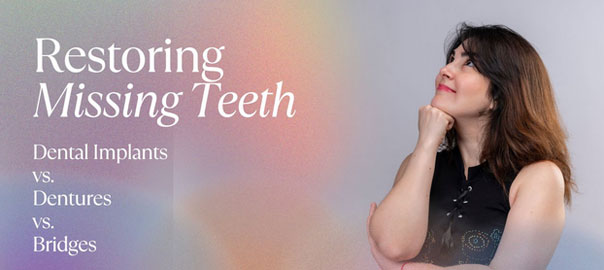
Restoring Missing Teeth: Dental Implants vs. Dentures vs. Bridges
Used as a dental replacement for several decades, the advancements in technology have made fitting, comfort, and aesthetics of dentures much much better. They are artificial teeth attached to a removable acrylic or metal framework. Here’s why dentures might be the right option for you:
1. Cost: Dentures are usually less expensive than dental implants, hence are affordable for people on a tight budget.
2. Rapid Recovery: Dentures can be fashioned and implanted much quicker than dental implants, whose placement and recovery period takes much longer to recover before they can smile like previously.
3. Versatility: The dentures are suitable in case of a few missing teeth or even the entire dental arch. Its installation as well as its removal can be done easily in case the patient requires adjustments, thus making it a good option for patients who may require changes later on.
4. Non-Invasive Procedure: Dentures are not necessarily surgical procedures, and they are not as invasive as dental implants; hence they are more accessible for people who may not be suitable candidates for implants.
Bridges: Filling the Gaps of Missing Teeth
Considered to be among the best alternatives for missing a single missing tooth or several missing teeth, dental bridges are a way of constituting an artificial tooth that might be utilized. They have two crowns holding both sides of a missing tooth for support. Here are some advantages of dental bridges.
1. Natural Appearance: Bridges are created to match the precise color, shape, and size of your natural teeth for complete incorporation in replacing your smile.
2. Stability and Functionality: The bridge design gains stability from surrounding adjacent healthy natural teeth or implants and achieves the normal function of biting and chewing
3. Time-Efficient: As with dentures, bridges are designed and are prepared for delivery relatively swiftly and thus an immediate tooth replacement option
Reasons to Use a Better Option
Dental implants, dentures, or bridges can be compared for selection based on the considerations below others:
1. Oral Health: The state that you will be left with in the remaining teeth and gums will determine which of the alternatives is suitable for you.
2. Bone Density: In the dental field, implants require an adequate mass of bone in the jaw for supporting them. A low bone density calls for more procedures, such as bone grafting.
3. Longevity and Maintenance: The implants are the longest lasting whereas the dentures and bridges have time lapses wherein their adjustment or replacements are required.
4. Cost: Generally, dental implants are more expensive than dentures and bridges. However, in the long run, they are bound to be a good investment as they would last there forever with the immense benefits it would bring about in the oral cavity to overcome the front-end expense.
5. Comfort and Convenience: Dental implants are highly convenient in terms of comfort. These are just like natural teeth since they have the minimum influence on eating habits and comfort. Dentures and bridges, can be effective, but these feel somewhat foreign in the mouth for patients with whom they have to become accustomed, and they generally do not provide maximum stability.
Leave a Reply
Leave a Reply
Explore More Similar Posts
Explore More Blogs


Leave a Reply